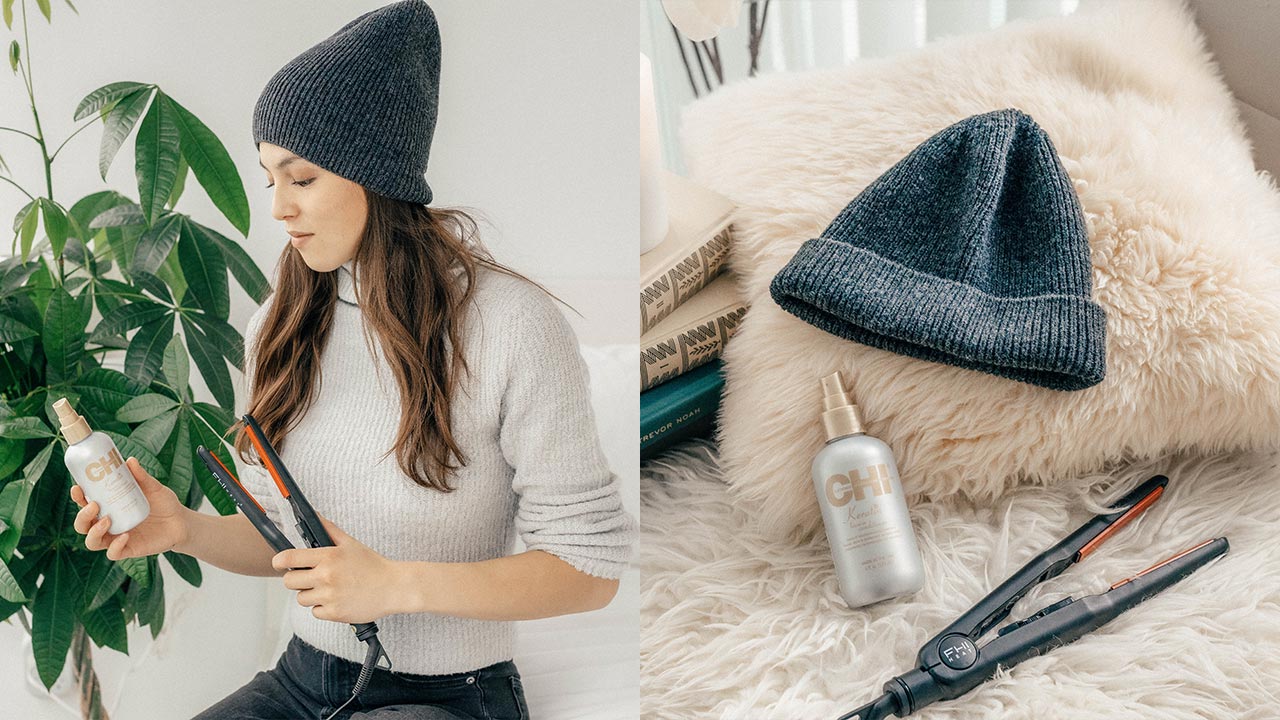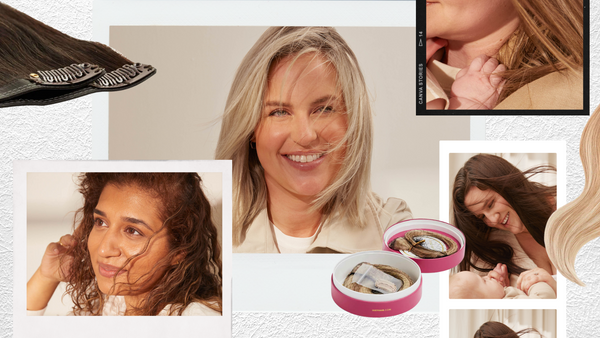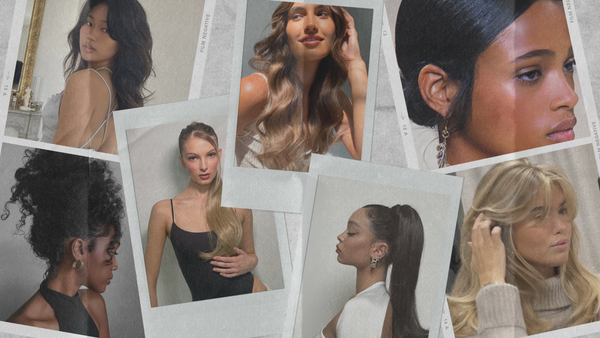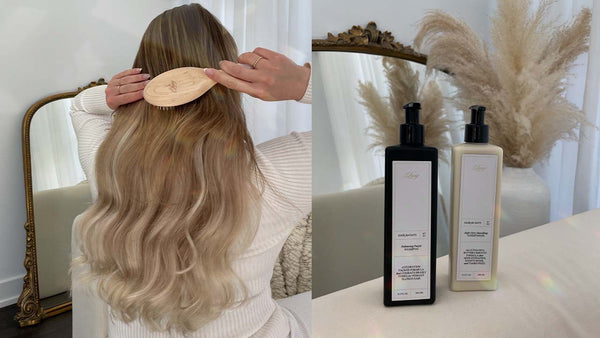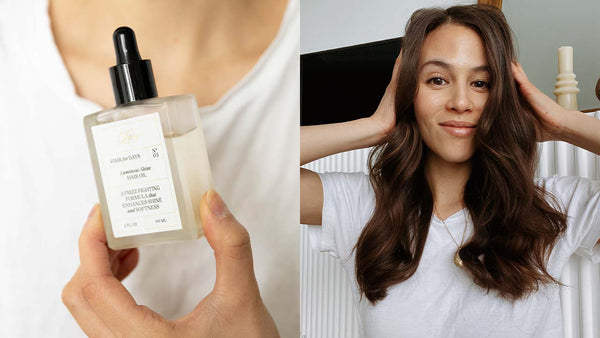It’s the most hair-drying time of the year. Winter hair problems are real, and they are a major inconvenience when all you want is luscious, moisturized locks that stay smooth in lower temperatures.
Just like your skin goes through transitions while the seasons change, the changing environmental factors impact your hair too.
This winter get into a cold-weather hair routine that includes habits and products that will specifically protect your hair from the cold air. Our all-encompassing winter hair care guide is here to help you take care of your locks this season.

Common Winter Hair Problems & How to Deal with Them
Just like you need to take precautions to protect your hair in the summer, you also need to protect your hair in the winter. Every season will bring out different things (both good and bad) in your hair, and the best way to combat these problems is to plan ahead.
Know the changes your hair will face, and prepare to protect your hair from these nuisances to keep your locks looking soft, smooth and healthy. This winter, prepare to protect your hair from these common winter hair problems:
Static Hair

What Causes Static Hair
Static hair is caused in the winter because as the air’s moisture levels drop, the dry air causes your hair to pick up more electrical charge.
Static hair is the result of electricity, atoms, and a lot of scientific jargon we won’t get into. Long story short, our hair is made up of atoms which, when rubbed against other atoms, gets charged with electricity. Still following us? Good.
How to Fix Static Hair
To fix static hair, there are a couple of things you can do.
1. Use a metal comb
Switch out your plastic hair brushes and combs for metal ones, to help reduce static, as plastic tend to hold more static charge than metal.
2. Use an ionic hairdryer
Ionic hairdryers blow out negatively charged ions, which work against the positively charged water molecules in your hair to reduce static electricity. Negative ions also do not open up the hair shaft, leading to smoother, shinier hair.
3. Use a dryer sheet or hand cream for a quick fix
Dryer sheets are specifically designed to reduce static when drying clothes, and you can use them for your hair as well! If you find yourself taking off your coat and dealing with a staticky head of hear, simply run a dryer sheet over your hair for instant smoothness. Alternatively, take a tiny drop of hand cream and apply it over your hair to quickly smoothen flyaways.
4. Switch to a microfibre towel
Microfibre towels have smaller loops in between the fibres (hence why they're called "microfibre", which lead to less pulling and snagging as your dry your hair. This in turn, leads to smoother, less staticky hair.

5. Use a bit of hairspray
If you're styling your hair and keep getting interrupted by flyaways, use this little trick: spritz a tiny bit of alcohol-free hairspray onto a metal comb and slowly brush over flyaways to smoothen them down.
6. Wear more natural fabrics
Synthetic fabrics are notorious for holding static electrical charge, leading to stubborn, staticky hair. Instead, opt for organic, natural fabrics like silk, cotton, or wool to minimize static charge.
For one, you can use a metal comb that will eliminate any static in your hair. Alternatively, to prevent the static hair, use moisturizing products that will add moisture to your hair so that it doesn’t react as much to winter’s cold air.

Dry Hair

What Causes Dry Hair
Dry hair occurs when your hair lacks moisture. One of the leading causes of dry hair is cold air. This is because as the weather gets colder, the air gets drier. Dry air strips your hair of moisture, which results in dull and brittle hair that is prone to split ends.
How to Fix Dry Hair
There are various ways to fix dry hair. To hold your hair’s moisture, apply less heat, refrain from over-washing it, and stick to moisturizing hair products with naturally hydrating ingredients. The reality is that so many hair products are packed with drying ingredients like alcohols, so be cautious of the ingredients in your products. Here are a few ways to fix dry hair during the winter time.
1. Use a silk pillowcase
Just like using a microfibre towel, silk pillowcases have smaller fibres compared to cotton, which leads to less snagging and pulling on your hair as you sleep. Another advantage to using a silk pillowcase is also smoother skin over time and reduced potential for wrinkles due to the smoother fabric surface.
2. Apply a hair mask at least once a week
We love hair masks as they are a quick, easy to way to infuse moisture into your hair. From DIY hair masks to store bought, use a hair mask at least once a week to keep your hair moisturized and hydrated throughout the winter months.
3. Try double conditioning
You may have heard this term trending in the past few months. Basically, double conditioning is exactly what it sounds like. Wash your hair, condition, rinse, then wash again for that extra hydration.
4. Stay hydrated
Moisture starts from within, so be sure to drink extra water throughout the winter months.

5. Use a humidifier
You may have noticed that it is much easier to keep your hair and skin hydrated in the summer-time. That's because the air holds more moisture and is much more humid. Because winter is colder and dryer, invest in a humidifier for your bedroom, which will mimic that humid summer hair, leading to more naturally moisturized skin and hair.
6. Less is more!
Remember, the less you do to your hair, the more hydrated it will stay during colder months. That means less heat styling, less washing, less dyeing, as all these will dry your hair out even more.
Split Ends
What Causes Split Ends
Healthline defines split ends as when the ends of your hair become dry brittle and frayed. Split ends happen when the ends of your hair becomes dry, brittle, and frayed.
A general cause of split ends is the chemicals present in a lot of hair care products. The cause of split ends specifically in the winter, however, is the combination hair being exposed to both cold air and heat-based hair techniques like straightening and blow-drying.
How to Fix Split Ends
Fortunately there are ways to get rid of split ends. To fix split ends you can get a haircut or, more practically, take precautions with protective products before applying heat to your hair.
Hat Hair

What Causes Hat Hair
Hat hair is caused when the hat you wear rubs against your hair to cause friction. This friction often manifests as frizz and static. Hats can also cause your hair to look flat as they stick to your head and reduce volume.
Beanies and touches maybe a cute look, but hat hair isn’t. Even armed with the best clip in hair extensions you can be faced with hat hair, but this is something that can be easily fixed.
How to Fix Hat Hair
To fix hat hair, you don’t need to forgo wearing a hat. Instead, you just have to be cautious of the material of your hat and strategically style your hair to avoid the dreaded flat, hair hair.
1. Opt for for silk-based hats.
The fabric’s smooth texture will help reduce any hat-induced frizz or static by smoothing your hair cuticle. Consider the winter hair accessories that won’t give you hat hair.
2. Make sure your hair is cooled down before throwing on a hat
Flat hair happens when you wear a hat over hair that's still warm from styling or hasn't fully dried yet. Be sure to cool your style down completely and make sure your hair is dry before wearing a hat and facing the outdoors.
3. Revive your roots
Once your take your hat off, give your hair a flip upside down to add a bit of volume back into your roots. You can also use a teasing brush to tease the roots for extra lift.
4. Choose your hairstyle accordingly
Avoid those big voluminous blowouts if you know you will be wearing a hat. Instead, opt for a sleeker hairstyles, beachy waves, or a side braid, which won't be bothered when you throw your hat on.
Tangled hair
What Causes Tangles
Tangles are caused by a variety of things; unruly hair, not washing and brushing your hair properly, and just the general make up of your hair. In winter, however, your hair is that much more prone to tangling.
This is due to the fact that the cold air will dry and damage your hair, causing your hair’s cuticle to open up and tangle.
Whoever came up with “no tangles no tears” definitely has never experienced Canadian winters—because around here, it’s all tangles (and maybe a couple of single tears) when winter rears its freezing head.
How to Fix Tangles
1. Brush your hair throughout the day
This may sound simple, but sometimes the best solutions are the easiest! Keep a small paddle brush in your purse, and simply brush your hair periodically throughout the day to keep tangles at bay. Remember, even your hair extensions can get tangled, so if you do wear hair extensions, you will need to brush your hair even more frequently.
2. Braid the under section of your hair
If you've experience hair tangling in the winter-time, it's likely at the nape of your neck where high collars and scarves cause the most friction. To avoid this, try braiding the section of hair at the nape of your neck to keep it out of the way.

3. Put your hair up
Or, you can simply avoid that dreaded tangled hair at the nap of your neck by putting your hair up into a high ponytail or messy bun.
4. Utilize detangling sprays
These open up your hair so that your tangles are easier to brush out. Be use a small tooth comb that will help to separate your tangled locks.
Itchy & Dry Scalp
What Causes Dry & itchy Scalp
Winter’s cold temperatures tend to dehydrate your hair, which causes dry and itchy scalp (also known as Scalp pruritus), as well as conditions like dandruff and Seborrheic dermatitis. Seborrheic dermatitis, in fact, is a condition often brought upon by seasonal changes.
How to Fix Dry Scalp & Itchy Scalp
Fortunately, there are ways to treat dry and itchy scalp. One of the best ways to do this is to use products with silicone oil. Silicone oil helps to hydrate and balance your hair and your scalp to better protect you from the effects of cold air.
Itchy scalp, on the other hand, can be treated with products containing panthenol. Panthenol keeps your hair hydrated longer by binding moisture to your locks. Products with hyaluronic acid should have a similar effect.
If your dry or itchy scalp is starting to flake, consider a product with salicylic acid. Salicylic acid exfoliates the scalp to break down any build up and remove dead skin cells. Your black shirts will thank you. Ultimately, any products with anti-inflammatory and moisturizing ingredients should help relieve your dry or itchy scalp. Some other ways to combat a dry, itchy scalp include:
1. Use a scalp scrub
Scalp scrubs are quickly gaining popularity as a powerful way to reset your scalp and get rid of those dry flakes.
2. Use tea tree oil
After washing your hair, apply a few drops of tea tree oil to your scalp where you part your hair. Due to its anti-fungal properties, tea tree oil will help reduce those dry, flaky patches.
3. Apply coconut oil to your scalp
Before washing your hair, apply a healthy amount of coconut oil all over your scalp and let it sit for 10-20 minutes. Wash your hair as normal and watch your scalp become hydrated instantly.
4. Stay hydrated
Again, hydration starts from within so be sure to drink enough water during colder months to reduce dryness.

Dandruff
What Causes Dandruff
There are various factors that could cause dandruff including oily skin, insufficient shampooing, and general scalp sensitivity. Skin conditions like psoriasis, eczema and malassezia (a fungus that tends to feed on oils from the scalp) are also potential causes of dandruff.
The reality is that dandruff is bad both in the summer and winter. Winter’s cold air just enhances the issue by drying out the scalp. Dandruff is also more apparent this time of year because we wear darker clothes. Unfortunately, your cute black knit sweater will show dandruff more than the light coloured dresses you were rocking all spring.
How to Fix Dandruff
To fix dandruff, consider shampooing more often, exfoliate, and use products with oils to moisturize your scalp and reduce flaking. Also, consider the external factors like stress that can be causing your dandruff.
Frizz
What Causes Frizz
Frizz is caused by a lack of moisture in your hair — and we’ve all learned now that winter basically steals all the moisture from your hair. Humidity can make frizz worse in the summer, but ironically it’s the lack of humidity in the winter that actually can bring upon frizz. Winter’s dry and cold air damages the hair cuticle, which causes frizz and stray hairs.
How to Fix Frizz
There are various ways you can tame frizzy hair. The easier way, however, is being cautious of the products you use and how you use them. Use shampoos with nourishing ingredients like glycerin, and conditioner your hair without shampoo at least twice a week to really lock in moisture.
Flat Hair
What Causes Flat Hair
At Luxy Hair, we know how annoying flat hair can be. Unfortunately, the cold air is a leading cause of flat hair. This is because when the air removes the moisture out of your hair, it can leave your locks looking dull and lifeless.
How to Fix Flat Hair
How do you fix flat hair when the winter's harsh wind ravages your locks, leaving them limp and lifeless? It’s all in the products you use. Look for lightweight conditioners that won’t weigh down your hair, and volume-enhancing shampoo designed to give your hair some life.
It’s also important to not overwash. Shampoo your hair every other day because shampooing too often will dry your hair of the moisture it was able to retain.

Healthy Hair Tips to Avoid Winter Hair Problems
Protect Your Hair: Wear a hat and a scarf to protect your hair from the cold air and other environmental factors. Plus, with conductor hats and other stylish hats, there are so many ways you can protect your hair in style.
Stay Hydrated: A lot of the winter hair problems that occur are a result of the cold air removing moisture from the scalp. Keep your hair hydrated with different products ranging from leave-in conditioners to hair masks to lock in your hair’s moisture.
Regular Hair Cuts: People tend to cut their hair in the summer to keep it lightweight, but trimming your hair is just as important in the winter due to the split ends that commonly occur during this season.
Don’t Leave Your House with Wet Hair: If you go out in the cold with wet hair, the cold air can freeze strands of your hair, which leads to breakage. You can easily prevent this damage by taking the extra 10 minutes to dry your hair with a blow dryer or wash and style it the night before so that it has time to dry naturally
Written by: Brittany Rodrigeuz
